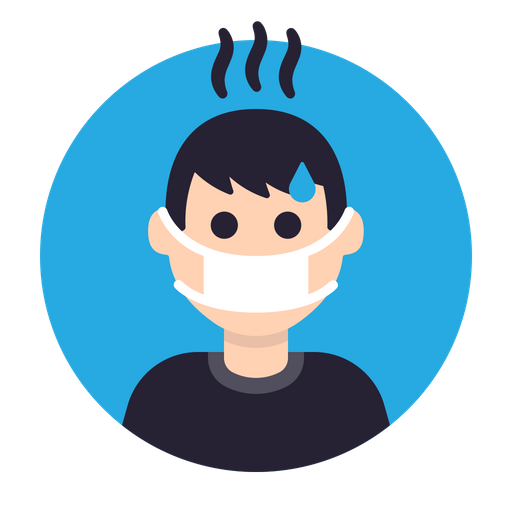As children, many of us were kept home when ill, both to facilitate recovery and to avoid spreading our colds to other kids. Many of us have probably been sent home by a manager when we tried to wait tables with a cough and runny nose. It’s widely accepted, from childhood to adulthood, that one shouldn’t show up to things when sick. So in healthcare, of all fields, why is it normal to do exactly that?
A 2015 paper from JAMA Pediatrics surveyed over 900 physicians and advanced practice providers (APP’s) on their feelings regarding the risk that they pose to patients while sick, and why they might go to work anyway [1]. The results were alarming – 95% of survey respondents reported that working while sick posed a risk to patients, yet 83% still reported working while sick at least once over the past year. Perhaps worse, almost 10% of respondents reported working sick 5 or more times. Medical students should note that physicians were almost twice as likely to work while sick than APP’s were.
This is not an error of ignorance, as the case can easily be made that healthcare workers (HCWs) are the most keenly aware of the risks of infectious spread to already sick patients. So why take that risk? As with many dilemmas, the answer is multi-faceted. Physicians and APPs alike reported “not wanting to let colleagues down” as the greatest concern for missing work due to illness. Close runners-up included staffing concerns and not letting their patients down, while more distant concerns focused on fear of ostracism and ensuring continuity of care in patients.
These results suggest an interesting scenario in which the desire to avoid disappointment supersedes the apparent risk of transmitting infections to patients. The effects of disappointment in one’s comrades can be felt immediately when confronted in a social situation, but shouldn’t the moral weight of making patients sick outweigh the need to maintain a positive image?
It’s important to note that this data and the phenomenon of working while sick predates the outbreak of COVID19. Perhaps the worst pandemic of our generation may change HCWs’ outlook on allegedly weighing image versus patient safety, right?
While hard data on this topic doesn’t exist yet for this pandemic, the available narrative from HCWs is yes. Currently, frontline workers are less willing to take the risk of getting patients sick, but unfortunately, the change in paradigm doesn’t seem to matter as much as one would hope. According to Kaiser Health Network, HCWs who have fallen ill have tried to make it a priority to isolate, but some employers insist that they come to work anyway, far sooner than public health guidelines recommend [1]. A nurse from New Jersey relayed that while afebrile, she was suffering from many of the other symptoms that have become classic with COVID – fatigue, malaise, dry cough, and GI upset. Despite this, her employer told her to come to work anyway. According to other reports from HCWs across the country, this is not an isolated incident.
The pandemic hit an unprepared US healthcare system, and many can appreciate the difficulties hospitals face to properly staff their wards. In these dire times, the skills of everyone are needed, but does that negate the risk of further spreading the infection if we ourselves have contracted it? This creates an ethical dilemma that every sick HCW must answer. On one hand, a short-staffed unit is suboptimal, and critical patients and fellow HCWs may suffer because of it. But an IV placed by a nurse that came to work sick is ultimately not helpful if the patient ends up sicker because of it. In either situation, it appears there is no winner. The core question becomes: which causes greater harm? Spreading under-staffed HCWs even more thinly during a pandemic, or spreading the virus further by exposing yourself to patients?
Further complicating this already distressful dilemma is the reality of working in the modern world of American healthcare. One must balance the “lesser of two evils” of staying home or going to work while sick, but one must also consider what many other HCWs have been presented with: if they stay home, they may not have a job to return to. A HCW may feel an ethical obligation to stay home to slow the spread of the virus if they fall ill, but their ability to provide for themselves and their families may be on the line if an employer decides that they must come to work anyway.
COVID19 seems to have shifted the pressures on why we work when sick, but it hasn’t changed the fact that HCWs are still clocking in with a cough. What should happen and what does happen rarely coincide, and such is the case in balancing the risks and costs of the decision of whether to treat patients when sick.
1. Szymczak JE, Smathers S, Hoegg C, Klieger S, Coffin SE, Sammons JS. Reasons Why Physicians and Advanced Practice Clinicians Work While Sick: A Mixed-Methods Analysis. JAMA Pediatr. 2015;169(9):815–821. doi:10.1001/jamapediatrics.2015.0684
2. Huetteman E. Nurses and Doctors Sick With COVID Feel Pressured to Get Back to Work. Kaiser Health News. https://khn.org/news/nurses-and-doctors-sick-with-covid-feel-pressured-to-get-back-to-work/. Published 2020. Accessed November 1, 2020.
Chris Laube is a student in the class of 2023. He was an EMT prior to med school, where he met his wife, and attended most community colleges in the Phoenix area as well as ASU. When not on rotations, he enjoys spending time with his wife and kids, pretending to be an endurance athlete, and video games.

